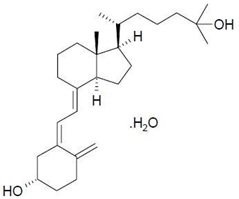Rayaldee
Generic name: calcifediol
Drug class: Vitamins
Medically reviewed by A Ras MD.
What is Rayaldee used for?
Rayaldee is a prescription medicine that is used to treat high parathyroid hormone levels in certain patients.
Description
Calcifediol, USP, the active ingredient in RAYALDEE, is synthetically manufactured as calcifediol monohydrate. Calcifediol is also known as calcidiol, 25-hydroxycholecalciferol or 25-hydroxyvitamin D3.
Calcifediol monohydrate is a white crystalline powder, has a calculated molecular weight of 418.65 and is soluble in alcohol and fatty oils but practically insoluble in water. Chemically, calcifediol monohydrate is (3β,5Z,7E)-9,10-secocholesta-5,7,10(19)-triene-3,25-diol monohydrate and its structural formula is:

RAYALDEE is formulated as extended-release capsules containing 30 mcg of calcifediol. Each capsule contains the following excipients: mineral oil, monoglycerides and diglycerides, paraffin, hypromellose, lauroyl polyoxylglycerides, dehydrated alcohol and butylated hydroxytoluene. The capsule shells contain modified starch, carrageenan, sodium phosphate, dibasic, sorbitol sorbitan solution, FD&C Blue #1, titanium dioxide and purified water. Medium chain triglyceride (fractionated coconut) oil is used as a lubricant during manufacture, and trace amounts may be present in the final formulation.
Mechanism of Action
Calcifediol (25-hydroxyvitamin D3) is a prohormone of the active form of vitamin D3, calcitriol (1,25‑dihydroxyvitamin D3). Calcifediol is converted to calcitriol by cytochrome P450 27B1 (CYP27B1), also called 1-alpha hydroxylase, primarily in the kidney. Calcitriol binds to the vitamin D receptor in target tissues and activates vitamin D responsive pathways that result in increased intestinal absorption of calcium and phosphorus and reduced parathyroid hormone synthesis.
Before taking Rayaldee, tell your doctor:
- If you are allergic to Rayaldee; any part of this medicine; or any other drugs, foods, or substances. Tell your doctor about the allergy and what signs you had.
This medicine may interact with other drugs or health problems.
Tell your doctor and pharmacist about all of your drugs (prescription or OTC, natural products, vitamins) and health problems. You must check to make sure that it is safe for you to take Rayaldee with all of your drugs and health problems. Do not start, stop, or change the dose of any drug without checking with your doctor.
What are some things I need to know or do while I take Rayaldee?
- Tell all of your health care providers that you take Rayaldee. This includes your doctors, nurses, pharmacists, and dentists.
- Have blood work checked as you have been told by the doctor. Talk with the doctor.
- If you take cholestyramine, talk with your pharmacist about how to take with Rayaldee.
- Tell your doctor if you are pregnant, plan on getting pregnant, or are breast-feeding. You will need to talk about the benefits and risks to you and the baby.
How is Rayaldee best taken?
Use Rayaldee as ordered by your doctor. Read all information given to you. Follow all instructions closely.
- Swallow whole. Do not chew, open, or crush.
- Take Rayaldee at bedtime.
What do I do if I miss a dose?
- Skip the missed dose and go back to your normal time.
- Do not take 2 doses at the same time or extra doses.
What are the side effects of Rayaldee that I need to call my doctor about immediately?
WARNING/CAUTION: Even though it may be rare, some people may have very bad and sometimes deadly side effects when taking a drug. Tell your doctor or get medical help right away if you have any of the following signs or symptoms that may be related to a very bad side effect:
- Signs of an allergic reaction, like rash; hives; itching; red, swollen, blistered, or peeling skin with or without fever; wheezing; tightness in the chest or throat; trouble breathing, swallowing, or talking; unusual hoarseness; or swelling of the mouth, face, lips, tongue, or throat.
- Signs of high calcium levels like weakness, confusion, feeling tired, headache, upset stomach and throwing up, constipation, or bone pain.
- A heartbeat that does not feel normal.
- Seizures.
- Not hungry.
- More thirst.
- Passing urine more often.
- Weight loss.
- Feeling very tired or weak.
- Bone pain.
What are some other side effects of Rayaldee?
All drugs may cause side effects. However, many people have no side effects or only have minor side effects. Call your doctor or get medical help if any of these side effects or any other side effects bother you or do not go away:
- Nose or throat irritation.
These are not all of the side effects that may occur. If you have questions about side effects, call your doctor. Call your doctor for medical advice about side effects.
You may report side effects to the FDA at 1-800-332-1088. You may also report side effects at https://www.fda.gov/medwatch.
If overdose is suspected:
If you think there has been an overdose, call your poison control center or get medical care right away. Be ready to tell or show what was taken, how much, and when it happened.
How do I store and/or throw out Rayaldee?
- Store at room temperature.
- Store in a dry place. Do not store in a bathroom.
- Keep all drugs in a safe place. Keep all drugs out of the reach of children and pets.
- Throw away unused or expired drugs. Do not flush down a toilet or pour down a drain unless you are told to do so. Check with your pharmacist if you have questions about the best way to throw out drugs. There may be drug take-back programs in your area.
Label
PRINCIPAL DISPLAY PANEL NDC: 70301-1001-1 – 30-COUNT BOTTLE LABEL
- NDC 70301-1001-1 OPKO
- Rayaldee® (calcifediol)
Extended-Release Capsules - 30 mcg
- Rx only

